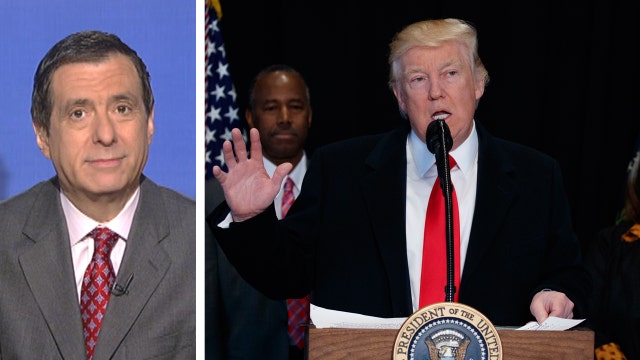Kurtz: Trump criticized on timing, not substance
'MediaBuzz' host Howard Kurtz weighs in on President Trump being critizied for not confronting anti-Semitism sooner
President Trump started the day by touring the Smithsonian’s National Museum of African-American History.
Then he gave an exclusive interview to Craig Melvin, a black correspondent for NBC, addressing the recent rise in bomb threats against Jewish community centers. “Anti-Semitism is horrible,” he said. “And it’s gonna stop and it has to stop…Whether it's anti-Semitism or racism or anything you want to think about having to do with the divide. Anti-Semitism is, likewise, it's just terrible.”
This felt like something of a reset for a president who has been battered by negative headlines and management missteps during his first month in office. And it came on the heels of Trump drawing widespread praise for tapping Lt. Gen. H.R. McMaster as national security adviser, and boosting the Border Patrol while easing deportation guidelines.
Trump is a divisive figure, as the mainstream media endlessly remind us. And it’s not hard to understand why his past rhetoric on Muslims and Mexicans, and his current actions on the wall and the temporary travel ban, would reinforce that impression.
But the president’s trip to the museum—with HUD Secretary Ben Carson, the subject of an exhibit there—was not out of left field. During the fall campaign, he visited some black communities and churches and repeatedly talked about reducing crime and poverty in the inner cities. He mentioned that in his inaugural address as well.
The pundits tended to dismiss Trump’s appeals because Hillary Clinton, like most Democrats, drew overwhelming black support. Trump yesterday quoted Martin Luther King and declared that “we’re going to bring this country together.” A museum visit is symbolic, of course, but symbolism matters in politics.
There has been a growing drumbeat for the president to denounce the rise in anti-Semitic vandalism and threats. His daughter Ivanka, who converted to Judaism when she married Jared Kushner, did that on Monday. And her dad, who joined in yesterday, also said he would visit the Holocaust Museum.
But Politico’s headline captured the it’s-about-time narrative: “Trump Finally Confronts Anti-Semitism Head-On.”
At the press briefing, several reporters asked Sean Spicer why Trump had waited so long and whether he was “comfortable” delivering such a message.
“I think that it’s ironic that no matter how many times he talks about this that it’s never good enough,” Spicer said.
If the president had any hesitation, it may be because of the emerging narrative that he is somehow to blame for the increase in anti-Jewish incidents since the election. I always think it’s unfair to blame a political leader for violence or vandalism carried out by people who support him. I felt the same way about critics who blamed Barack Obama for urban riots or shootings of police officers.
Yes, the White House statement on Holocaust remembrance should have mentioned the wholesale slaughter of Jews, but it’s a long way from that misstep to the suggestion that he was tolerating a rise in anti-Semitism. These are hate crimes, pure and simple.
Those who criticized Trump for not speaking out earlier should at least give him his due for speaking out now, unless they somehow believe he should do everything on their timetable.





